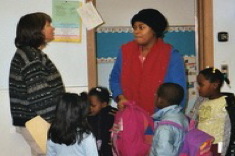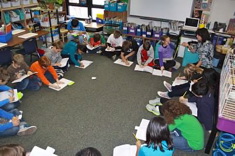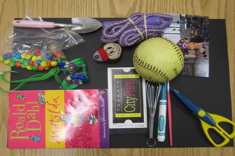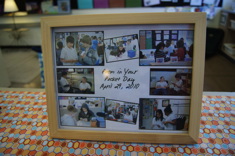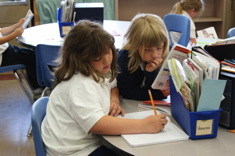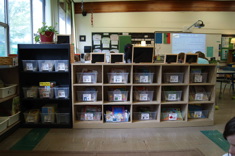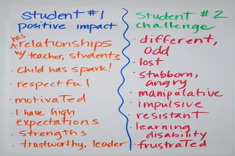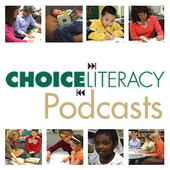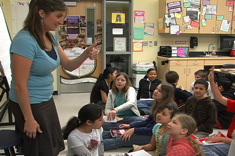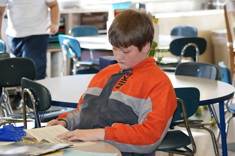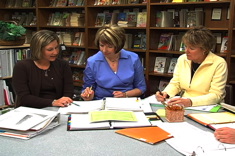Community Building
It's one of the big paradoxes of literacy instruction - students best learn how to read and write independently when they have a strong community of support in classrooms. How teachers build those thoughtful, kind, and challenging classroom communities is explained in these resources.
Latest Content
Conferring with Parents (ROUND-UP)
There is always a new tweak to consider with conferences involving families. Choice Literacy Contributors have both the head and heart in mind with these tips.
Image of the Week: Building a Classroom Community Through Visual Literacy
Teachers know visual learners are in every classroom, and Andrea Smith is no exception. She uses an “image of the week” to get at high expectations, observations, publishing, and, of course, building community.
Conferring with Parents (Part 2)
In this second installment in the two-part series, Choice Literacy Contributors share their top tips for making conferences with families effective and fulfilling.
Writers, Choice and Independence (Part II)
In this second installment of a two-part series, Aimee Buckner writes about the value of open choice writing units.
Tuesday Trades: A New Literacy Ritual in My Classroom
Tuesday Trades are a terrific way to increase peer book recommendations. Andrea Smith created this new weekly activity with her intermediate students, building on existing workshop routines.
Letting Go After Holding on Tight: Reflecting on the Last Days of School
Andrea Smith writes about how our instincts as parents and teachers merge to make it so hard to say goodbye at the end of the school year.
An ESL Poetry Cafe Celebration (Part II)
Stella Villalba explains how her Poetry Cafe program brings families together for a festive event, and helps English language learners develop reading and fluency skills at the same time. This is the second installment in a two-part series.
Connecting Yoga and Character Traits in Literature Study
If you are a yoga devotee, you will enjoy this feature. Ann Williams discovers yoga and literature mix beautifully as she helps her 4th grade students explore character traits.
A Bad Case of the Never-Ending Januaries
With a tough winter and tougher budget prospects, many schools will be dealing with the Januaries straight through March. Our contributors have suggestions for dealing with stress, fatigue, and depression to help renew and re-energize your work.
Using Jackdaws to Build Community in Kindergarten
Mandy Robek gives us the how-to as she revises a community-building project to make it a better fit for Kindergarten students.
Tuesday Trading Post: Involving the Whole School in a Book Exchange
Here's a terrific idea for building the home/school reading connection and involving parent groups in literacy. Andrea Smith shares the nuts and bolts of the Tuesday Trading Post, a schoolwide book exchange.
On Compassion
You’re a sucky teacher!” How would you respond if a student hurled those words at you? Katie Baydo-Reed shares a deeply honest and personal account of the year early in her career when she developed a corrosive relationship with her students, and what she learned from the experience about compassion.
Poetry Fridays (and So Much More) for Students and Staff
 Mary Lee Hahn finds Poetry Fridays are about so much more than poetry, or even a pleasant end to the week. She shares how this activity is a wonderful way to bring together colleagues and students.
Mentor Texts to Help Students Monitor Their Actions
Mandy Robek has a delightful list of books that help students reflect upon and monitor their behavior in the classroom.
Sense of Little Engines
Heather Rader writes about "agency" – the challenge of letting students and teachers take charge of their learning. In concrete examples from a third-grade classroom and a professional development scoring session with teachers, Heather shares the subtleties of learning to trust, wait, and celebrate when learners of any age are responsible and independent.
Books with Overlooked Potential for Launching the School Year (and Ideas for Using Them with Students)
You know those books that cause us to say, “Aww…I love that book.” Well, the team at Literacyhead has us thinking about using old favorites in new ways.
Clare Landrigan and Tammy Mulligan on Getting the Most Out of Grade-Level Team Meetings (PODCAST)
In this podcast, Clare Landrigan and Tammy Mulligan, the founders of Teachers for Teachers, talk with Franki Sibberson about how to link grade level team meetings with student achievement, and build stronger teaching communities at the same time.
Books for Launching the School Year (and Ideas for Using Them with Students)
We all want students starting school with intention, confidence, community and more. These books from the team at Literacyhead can help.
5 Easy Steps to Becoming Active in the Blog Community
If you are beginning to involve yourself more in online networks, you might enjoy these suggestions from Mary Lee Hahn and Franki Sibberson.
The Power of Linking Words and Perceptions
Melanie Quinn relays a powerful practice for staff members to reframe language and perceptions while putting common labels for students in a whole new light.
Not That Into Me
If you're a literacy coach, those teachers who don't want to work with you can make you feel like the wallflower at the prom or the last kid picked for the basketball team. Heather Rader has positive, proactive suggestions for making the best of an awkward situation.
The Amazing School Librarian: An Interview with John Schumacher (PODCAST)
Franki Sibberson interviews extraordinary school librarian and blogger John Schumacher in an inspiring podcast that will get you thinking in new ways about school librarians and their role in your learning community.
The Triple Threat: Building a Community, Discussion Skills, and Writing Stamina
Katie Doherty knows how to pick the right text to move from whole-class conversations to writing.
Strawberries, Fun, and Student Blogging
Andrea Smith evaluates the success of her new student blogging program.
Closing Out the Year Round-Up (PART 1)
Here are some fresh and fun ideas for Closing Out the School Year from Choice Literacy Contributors Aimee Buckner, Trish Prentice, Karen Terlecky, and Stella Villalba.
Newbery Club Wrap-Up
Even though their Newbery Club of 5th graders didn't read the winning book in advance, Maria Caplin and Bill Prosser consider the club a success. They close out their series on the club with thoughts on how they will do things differently next fall.
Closing Out the Year (PART 2)
Here are some fresh and fun ideas for closing out the school year from Choice Literacy Contributors Katie Doherty, Gail Boushey and Joan Moser (“The Sisters”), and Mandy Robek. This is the second installment in a two-part series.
An Attitude of Gratitude
Heather Rader gets three nasty emails, and thinks through how to hold on to an attitude of gratitude when dealing with colleagues who are short-tempered or demanding.
Tips from Literacy Leaders for Closing Out the School Year (ROUND-UP)
Here are some suggestions from Choice Literacy Contributors of the best ways to close out the year, with everything from personal organizing tips to family events.
Writers, Choice and Independence (Part I)
What does true independence look like among young readers and writers? A chance comment from a visitor to Aimee Buckner's classroom gets her pondering the amount of choice children have during units of study.
Browse Content By
Type
Category
- Assessment Tools
- Big Fresh Archives
- Booklists
- Choice Numeracy
- Classroom Design
- Common Core
- Community Building
- Conferring
- Content Literacy
- Digital Literacy
- English Language Learners
- Equity
- Family Relations
- Free Samples
- Guiding Groups
- Leadership
- Literacy Coaches
- Mentor Texts
- Minilessons
- New Teacher Mentors
- Podcasts
- Poetry
- Quote Collections
- Reading Strategies
- Self Care
- Struggling and Striving Learners
- Talking and Listening
- Teacher Study Groups
- Teaching Reading
- Teaching Writing
- Word Study and Vocabulary
Author
- Melissa Quimby
- Nawal Qarooni
- Gwen Blumberg
- Julie Cox
- The Lead Learners
- Hannah Tills
- Josie Stewart
- Ruth Metcalfe
- Mallory Messenger
- Becca Burk
- Jodie Bailey
- Vivian Chen
- Mary Brower
- Tiffany Abbott Fuller
- Stephanie Affinito
- Ruth Ayres
- Leigh Anne Eck
- Heather Fisher
- Shari Frost
- Julie Johnson
- Suzy Kaback
- Gigi McAllister
- Shirl McPhillips
- Melanie Meehan
- Cathy Mere
- Debbie Miller
- Tara Barnett and Kate Mills
- Tammy Mulligan
- Dana Murphy
- Bitsy Parks
- David Pittman
- Brenda Power
- Heather Rader
- Matt Renwick
- Mandy Robek
- Christy Rush-Levine
- Gretchen Schroeder
- Jen Schwanke
- Brian Sepe
- Katherine Sokolowski
- Stella Villalba
- Jennifer Vincent
Grade Level
Choice Literacy Membership
Articles
Get full access to all Choice Literacy article content
Videos
Get full access to all Choice Literacy video content
Courses
Access Choice Literacy course curriculum and training



